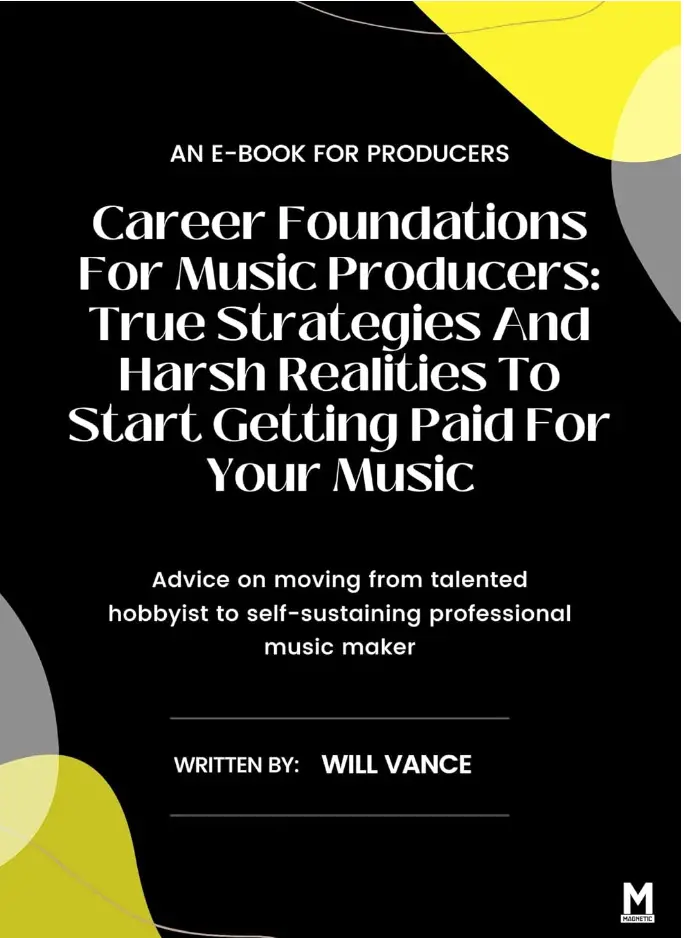Table of Contents
More people than ever are getting into the game of producing music, which is one of the coolest things in the scene that has changed over the last ten years that I’ve been a music producer. Watching the evolution of the scene and the community grow has been amazing. What makes it so cool for me personally is the benefits that producing tunes and the lifestyle and hustle that comes with it has brought to my life overall, beyond the technical and creative aspects of producing the actual music. And I know you can find the same.
It’s almost cliché to say that music producers these days have to wear many hats, but it’s true. A music producer needs many skills to perfect and practice that can benefit all other aspects of life. In this article, I will share the essential skills music producers need and the ways I’ve learned to improve each of these facets and skills over my career as a producer, record label owner, label manager, and A&R director.
Rome wasn’t built in a day, and music production is a similarly long game. This means you have plenty of time to hone all these skills simultaneously. So, let’s dive into the list of essential skills that music producers need.
At the end, we’ll talk about all the ways to fast-track your career through the earliest and arguably hardest stages of being a music producer. But for now, let’s get after it….
Technical Skills (…Duh)
The first and most obvious skill is the technical side of producing music.
This includes mixing, mastering, and understanding the science behind making a record sound commercially viable and radio-ready. This can arguably take the longest time because a mix is never “truly” done and there’s always a leeeeetle bit more that you can do on an EQ or compressor that could, technically, make it sound better. Some producers I know, like Hans Bierger, have been at it for many years, and even he admits he’s still a student of the game.
The sign of a true aster here, I’ve learned, is to know when to just call it good and move on to the next project; trusting in your work as a job well done is the hallmark of a pro on this one.
It’s a constant process of improving your sound, developing your ear to hear tiny resonances only a few hertz wide that might be eating up headroom and making your mix sound harsh. It’s about learning how to tastefully distort elements, add warmth, and use the stereo field to create a three-dimensional mix. While these skills might seem a bit more vanilla and textbook by nature, they are precious in their own right, even if it feels like a slog to perfect (doubly so because the more you know about the craft, the better at it you realize your favorite artists all are).
How Any Producer Can Improve This
Luckily, training your ears to hear these things will come naturally over time, especially if you’re mindful and critically listening to the sonics of your music, ensuring each element has its own space and sits properly in the mix. With enough practice, you’ll just naturally develop an ear for it. However, one way to fast-track this process is by using sites like SoundGym or paying a professional mix engineer for feedback.
Mixing is one of those areas where you don’t know what you don’t know.
Often, having someone pinpoint the exact issues in your mix can be an instant light bulb moment, and the ability to have a pro identify something wrong in your mix and, better yet, tell you how to fix it, will not only solve the issue in that song but also make you more aware of similar problems in your next track, mix, or whatever.
Creativity
The whole meta-physical concept of creativity can be a hot-button issue.
Many people think it’s something you either have or you don’t…
You either are creative or you are not…
But after years of doing this, I’ve learned that I see it more like a language in which your fluency waxes and wanes rather than a binary yes or no. When it comes to producing music at your highest level, creativity is an essential skill that you should always cultivate, just as a world traveler must always practice their languages in the cities and nations in which they wish to travel, or else risk losing the minutiae of their expertise and fluency.
The act of music production is the exact same, and the more you work in and with your DAW, the more you learn its language. Much like Latin is close to French, which has words that derive from Spanish, all DAWS are unique in their own right but also have their own vernacular (at least in this analogy).
You learn how your DAW works, how different filters sound, how different saturations work and sound, and how to use it in a mix. The more ingrained this knowledge becomes, and the more you’ve committed some of it to muscle memory, the less you need to think about it in the DAW. It stops being something you have to analyze and work through while producing. Instead, it becomes a vehicle to get ideas out of your brain and into your DAW.
Thats not at all dissimilar from learning a new language, right? If you only know 500 words in French, you might be able to order food at a local restaurant while traveling, but you won’t fully understand the menu or know the wine pairings, let alone the history of the local region that inspired the food on the menu in the first place. As your vocabulary increases, you gain a richer understanding and can converse with the server more naturally, opening up more forms of communication that can enlighten you on these exact details.
Creativity in music production is the same, and the less friction you have to experience from the technical side of “knowing your DAW,” the more free-flowing your ideas are as they move from the inspiration in your head to the arrangement view of your DAW.
How Any Producer Can Improve This
Language is all about reference points.
The more reference points you have—meaning the more vocabulary you have—the more fluent you are. This makes it easier to connect the dots and piece together sentences for conversations, like chatting with a aforementioned server at a restaurant.
To build this creativity, you need a wide breadth of reference points in and outside of your DAW.
A great way to do this, at least that has worked for me, is to find YouTube channels with tutorials on producing a wide breadth of different music genres. Pick up tips and walkthroughs from these videos, blog articles, forums, and similar resources. However, just reading or watching isn’t enough. You need to actively make music to let the information sink in.
Julien Earle is a fantastic example of this, as he does short 10-15 minute track breakdowns of the various popular artists in the moment, which helps give essentially a short overview of their style of vibe without getting so far into the weeds of it all that you lose motivation to actually MAKE music.
[embed]https://youtube.com/watch?v=xlqvAZWsfZI&si=Cx4jEgt926GR8sGr[/embed] [embed]https://youtube.com/watch?v=W3jyWzyP_5Y&si=ooYETzJs2oP9pr0T[/embed]I encourage you to block out fifteen minutes to learn something new and then immediately apply it to your next song or studio session. Putting what you learn into practice right away helps solidify your understanding. Do this across a wide range of genres and styles, and soon you’ll have a comprehensive set of inspirations and creative tools to use as reference points. This approach makes your style uniquely yours.
Now that we’ve covered the two most obvious skills, I’ll talk about the auxiliary skill sets I’ve developed over my career. These have benefited not only my life but also my creative process and music production output.
One important aspect, which might not sound like a skill set but more like a part of your lifestyle, is having a wellness routine. This can significantly improve the quality of your music, your dedication to studio time, your tenacity, and your work in your DAW. One of my mentors told me that:
To produce the best take of your life, you need to be the best version of yourself. – Paul Nolan
Staying healthy through diet, sleep, and exercise will pay off and hugely benefit your musical output as a producer. While it’s not a traditional skill set, it is something you can continually work towards
Wellness
As with any wellness routine or lifestyle change, jumping off the deep end immediately can lead to burnout and create unachievable goals. One book that really reframed a lot of this for me is Atomic Habits. It discusses how small changes can compound over time and significantly increase your overall output.
Instead of committing to drastic changes like going to the gym for an hour every day, meditating for an hour, and switching to the healthiest diet overnight, focus on small, achievable steps. For instance, go to bed 15 minutes earlier, read ten pages of a book daily, and meditate for five minutes instead of the overzealous alternatives. Gradually incorporating these small wellness moves into your life will have a bigger impact than trying to overhaul everything at once.
Reading five pages a day, studying music production for a few minutes each day, and other small, consistent actions are WAYYY more digestive. These small changes can be constantly worked on and built upon, providing exponential benefits to your music career and your overall enjoyment of the hobby.
Entrepreneurship
I recently wrote an article discussing whether you need a degree in music production to have a career as a music producer. The main point of my argument is that music production is unique in that you won’t reach a certain level and suddenly have job offers because of a certification.
Opportunities aren’t given based on a piece of paper in this game; they come from your skills in the studio and the opportunities you create for yourself.
This is very similar to how entrepreneurship works today (and throughout all time to be honest).
So with this in mind, it’s important to note that some of the best music producers are also the most entrepreneurial, with a keen eye for opportunities and a well-honed entrepreneurial skill set.
How Producers Can Get Better At This
Entrepreneurship really comes down to having a keen eye on what the market or an audience needs.
A good way to improve on this is to constantly think about what’s working for others and how you can draw inspiration from multiple sources and synthesize it into something that uniquely serves the market you’re wanting to succeed or thrive in.
My former boss at the Hyperbits Masterclass once said that one of the most defining pieces of advice he received from his mentors was that you don’t need to be the best at any one thing in life.
Trying to be THE BEST at a single thing is unrealistic.
Instead, to find success, you need to be the best at the intersection of a few different things you’re passionate about or good at. For me, most of my career in the music industry has been built on my passion for music production and my ability to write about it, sharing my knowledge through blog articles like this one.
I’m not alone in this.
So, constantly look for those opportunities.
Identify your skill sets, think about what unique things you bring to the table, what you love, and what you’re passionate about. Pair those with other interests to create unique opportunities, and adopt an entrepreneurial mindset for your career in the music industry.
Time Management
There is so much that goes into being a music producer beyond just studio time.
This includes emails, scheduling, research, digging for new samples and sounds, and networking. Time management and the ability to juggle these tasks while also balancing a social life, romantic relationships, and mental health to avoid burnout are incredibly important.
Remember, music production is a long game.
Whatever lifestyle you choose and however you organize your time, you will likely be grinding it out for many years before you see significant success and time management and how you use the time you’re given will make or break your career trajectory in this industry.
How Producers Can Get Better At This
The best advice I can give you on time management is to block out time, set schedules, and be intentional about sticking to them.
This includes non-studio time as well.
Spend an hour or two each week doing administrative work for your career. This could involve sending emails, networking, organizing your sample packs, researching labels you want to get signed to, or contacting local artists to collaborate. Blocking out this time and dedicating it to these tasks allows you to use it guilt-free for its intended purpose. Even if it isn’t directly creating music in your DAW, it supports your overall career and keeps you organized and productive.
When working in your DAW, setting time constraints for yourself is important.
For example, block out 30 minutes to write a chord progression. When that 30 minutes is up, you’re done.
There’s a saying that work expands to fill the allotted time, which applies here. Instead of just working on music for three hours, block out that time with specific tasks in mind. Only use those blocks to accomplish those tasks. This approach will streamline your creative process, make it more efficient, and likely lead to creating more music.
[embed]https://youtube.com/watch?v=gvIMC1D9U9g&si=FpJ26-msiSE-AbF-[/embed]One thing I’ve learned, especially after having my son and seeing my studio time drastically reduced, is that having endless time to work on music can cause it to lose value. You end up drifting through sessions, tweaking and fiddling without clear direction. Introducing time boundaries and constraints for specific tasks allows you to complete them efficiently, like checking off chores on a weekend, so you can move on to the more enjoyable parts of music production.
Social Skills
Social skills and your ability to interact with people in real life and online are crucial to your trajectory as a music producer, whether professionally or as a hobby.
It’s a personal, expressive, and people-driven industry.
While your studio skills will get you a seat at the table, what actually lands you opportunities is your ability to work well with others, show up on time, and be decent.
The industry has a reputation for being cutthroat and shady, and while that exists, most people I’ve encountered love what they do and want to make their jobs as easy as possible. Ensuring a job goes smoothly often comes down to working with good, easy-to-work-with people. I’ve seen many talented producers miss opportunities because they let their egos dictate their actions or simply weren’t pleasant to work with. They don’t get a call back the next day despite their talent.
How Producers Can Get Better At This
But that’s not to say that egos are bad or that you should leave your ego at the door. The music industry runs on egos, and everyone in it has one to some extent. It’s the fuel that keeps the engine chugging forward.
To navigate this, figuring out what others want early in your relationship is essential.
While everyone dreams of becoming a music producer, what success looks like varies greatly from person to person. Understanding what success means to those you work with can help you align your goals with theirs, making your work with them and how you choose to move with that relationship mutually beneficial while still getting what you want.
This approach will get you more opportunities and take you further in the industry than viewing it as a zero-sum game.
Situational Awareness

This is one of those things that could have been nestled under the entrepreneurial bucket, but it deserves its own space. The common dialogue around “making it in the music industry” says you need a big break or lightning to strike multiple times for a successful music career. But these are coming often from voices of many producers in online forums who take an overly passive passive role in their own lives, waiting for opportunities to come to them.
This has always boggled me.
I believe there’s a correlation between this passive approach and the many producers who never make it in the industry and complain about how “tough it is these days.”
A music producer must be able to make their own luck, and that can’t happen without situational awareness.
You need to constantly observe how the scene is shifting, how the industry is changing, and be ready to adapt and take advantage of these changes. What is popular and valued right now won’t be the same in five years or even a year from now.
Always maintain situational awareness to know when to move, when to change things, and when to take your shot. There’s a saying, “Strike while the iron is hot,” but “making the iron hot through striking” is equally valuable.
How To Get Better At This
There are many pros and cons to living in an age where information is so accessible.
On one hand, we have a wealth of knowledge at our fingertips.
On the other hand, much of this information is monetized with ads, like the ones you might have seen while reading this article.
This leads to many people peddling advice as if their answer is the only correct one. You’ll see clickbait headlines like “Ten Tips to Guarantee Success in the Music Industry” or “One Magic Bullet Trick to Find Success Overnight In Beatmaking.”
These headlines often dismiss any and all sultions but their own.
The reality is, anyone who claims to know the surefire way to succeed in the music industry either hasn’t found it themselves or is being overly anecdotal to the detriment of their own content (but hey, at least you clicked on their video or articles!).
No one truly knows how to guarantee success in this game; they only know what worked for them.
As I’ve mentioned throughout this article, everyone has different skill sets, opportunities, and things to leverage.
What works for one person may not work for another.
The best advice I can offer is to consume a wide range of industry advice and study the success stories of artists you admire. Look at stories from different genres—folk, rock, dance music, hip-hop—and find common threads between their experiences and your situation.
This approach will provide a more unique and personal, and thus effective, path for you in the producer career than any clickbait headline on a YouTube video.
Smart Decisions (Most Important)
As always, this article got a bit more long-winded than I anticipated, but hopefully, you were able to take away some valuable insights and tips on the skills a music producer needs to succeed in this industry. I want to stress that this is not a comprehensive or exhaustive list.
These are the skills I have developed over my 10-year career as a music producer.
Fortunately, many of these skills translate to other aspects of life and are not limited to music production and the assumption that just because you’re pursuing a dream as a producer means your skillset is entirely in a vacuum is completely false.
You can work on creativity, find unique ways to connect different aspects of your life to create unexpected outcomes and look for business opportunities outside the studio, all of which are invaluable life skills that extend beyond the studio and lay outside of the production hustle.
Luckily, we recently published an eBook for only $4 that outlines the most basic moves you could and should be making during the early and arguably most challenging stages of your career as a music producer. This book shares everything I’ve learned about the music industry throughout my first decade working professionally, and it doesn’t hold any punches. It’s not for the faint of heart or those with their rose-tinted glasses still on; it’s all about the cold realities and realistic strategies of wading through the morass of the modern music industry. It worked for me, and I hope some of it will work for you! so check it out.
The post What Skills Does a Music Producer Need? Expert Advice for New Producers appeared first on Magnetic Magazine.




